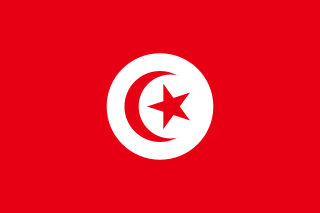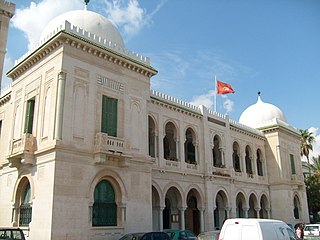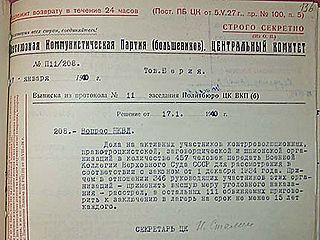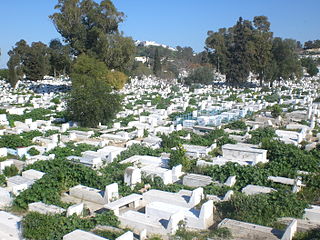
Muhammad VII al-Munsif commonly known as Moncef Bey was the Bey of Tunis between 19 June 1942 and 14 May 1943. He was the second to last ruler of the Husainid dynasty.

Muhammad VIII al-Amin known as Lamine Bey, was the last Bey of Tunisia, and also the only King of Tunisia.
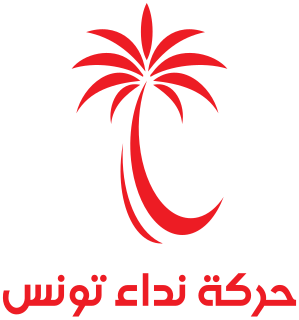
Nidaa Tounes is a big tent secularist political party in Tunisia. After being founded in 2012, the party won a plurality of seats in the October 2014 parliamentary election. The party's founding leader Beji Caid Essebsi was elected President of Tunisia in the 2014 presidential election.
Brahim Dargouthi, or Darghouthi, is a Tunisian, author of short stories and novels. A graduate of the Ecole Normale of teachers of Tunis in 1975, he taught in various schools and is the director of a primary school in Moularés Gafsa in 2013. He is also a member of the steering committee of the Union of Tunisian Writers and leads its industry Gafsa. Dargouthi is 460th in Arabian Business' ranking of the 500 most influential Arabs.
A political crisis evolved in Tunisia following the assassination of leftist leader Mohamed Brahmi in late July 2013, during which the country's mainly secular opposition organized several protests against the ruling Troika alliance that was dominated by Rashid al-Ghannushi's Islamist Ennahda Movement. The events came as part of the aftermath of the Tunisian Revolution which ousted the country's longtime president Zine El Abidine Ben Ali, followed by a general election which saw Ennahda win a plurality alongside Moncef Marzouki's allied Congress for the Republic (CPR). The crisis gradually subsided when Prime Minister Ali Laarayedh resigned and a new constitution was adopted in January 2014.

Hassib Ben Ammar(Arabic: حسيب بن عمار) was a leading Tunisian politician and journalist/editor. He was a powerful campaigner for human rights.
Mohamed Harmel was a Tunisian politician.

Wassila Ben Ammar, was the second wife of the former Tunisian president Habib Bourguiba and the First Lady of Tunisia from 1962 until 1986. She was called Majda (venerable).

Houcine Abassi, is a Tunisian unionist.

Ahmed Ben Salah is a Tunisian politician and trades union leader. His power and influence peaked between 1957 and 1969 when he was able to implement his ideas for a planned economy, holding simultaneously several key ministerial posts.
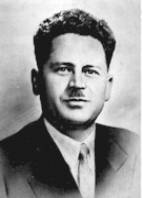
Farhat Hached was a Tunisian trades unionist.
The Habib Bourguiba bibliography includes major books about President Habib Bourguiba, his biography, presidency and policies.

The Ksar Hellal Congress was the first and founding congress of the Neo Destour party. The 1934 Neo Destour Congress was organized by the secessionist members of the Destour party, in Ksar Hellal, on March 2, 1934. It ended, that very night, with the creation of a new political party.

Mohamed Sayah was a Tunisian politician who held a number of ministerial roles in the 1960s, 1970s, and 1980s.
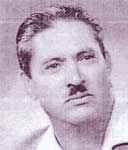
Habib Achour was a Tunisian trade unionist. As vice president of the International Confederation of Free Trade Unions, Achour was among the founders of the Tunisian General Labour Union (UGTT) in 1946, which he directed three times: from 1963 to 1965, from 1970 to 1978, and from 1984 to 1989.

Naceur Ben Jaâfar was a Tunisian politician and labour activist.

Mustapha Filali was a Tunisian politician. He was the first Tunisian Minister of Agriculture after their independence.



